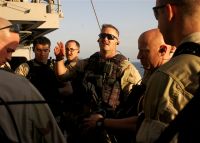ARABIAN SEA, March 25, 2011 — U.S. naval forces disrupted a pirate attack on a Philippine-flagged merchant vessel, after it reported it had been attacked by pirates yesterday.
All 20 Filipino crew members of the Falcon Trader II are safe and in control of the vessel, officials said.
At about 10:30 a.m. local time yesterday, the aircraft carrier USS Enterprise and guided missile cruiser USS Leyte Gulf responded to a distress call from the Falcon Trader II reporting that suspected pirates in a small skiff were trying to board the vessel.
In a second report, the Falcon Trader II crew reported pirates aboard, and that all 20 crew members had locked themselves into a safe room, also known as a “citadel.” The citadel is a secure room with food, water, communication and control over the vessel’s steering and propulsion, officials explained.
A SH-60F helicopter assigned to the “Dragonslayers” of Helicopter Anti-submarine Squadron 11 from the Enterprise and a SH-60B helicopter assigned to the “Vipers” of Helicopter Anti-Submarine Squadron Light 48 from the Leyte Gulf were sent to investigate.
The HS-11 helicopter fired warning shots to dissuade the pirates from continuing their attack. Two pirates were seen jumping off the Falcon Trader II’s bow, and the pirates’ skiff fled the area, pursued by the HS-11 helicopter.
As the pirate’s skiff tried to rendezvous with a larger vessel suspected to be acting as a “mother ship,” the pirates shot at the helicopter with assault rifles. The helicopter and its crew were not harmed and returned to continue reconnaissance.
“We could definitely see the muzzle flashes from their AK-47s, but we weren’t hit,” said Navy Lt. Joshua A. Overn, a pilot aboard the helicopter. “The antipiracy training we had received kicked in, and everyone conducted themselves with poise and professionalism.”
With no confirmation that all of the pirates had left the vessel, a Leyte Gulf crew member fluent in Tagalog remained in contact with the Falcon Trader II’s Filipino crew and monitored the vessel overnight. After observing no suspicious activity, Leyte Gulf’s “visit, board, search and seizure” team secured the vessel. After confirming no pirates remained aboard, they notified the crew that it was safe to come out of the citadel.
“It says a great deal about the inherent flexibility and capability of the Enterprise Strike Group that we were able to conduct counterpiracy operations while simultaneously flying Operation Enduring Freedom missions and coordinating air defense of the region,” said Navy Capt. Eugene Black, commanding officer of the Leyte Gulf.
U.S. forces continue to monitor the suspected pirate mother ship, officials said. Pirates are known to keep hostages on mother ships to prevent counterpiracy forces from acting directly against them.
“This is a great example of the teamwork inherent in a Carrier Strike Group,” said Navy Rear Adm. Terry Kraft, commander of Enterprise Strike Group. “We were lucky to be on scene when the attack occurred, and everyone did their jobs well.”
Source:
U.S. Department of Defense
Office of the Assistant Secretary of Defense (Public Affairs)

 von
von 